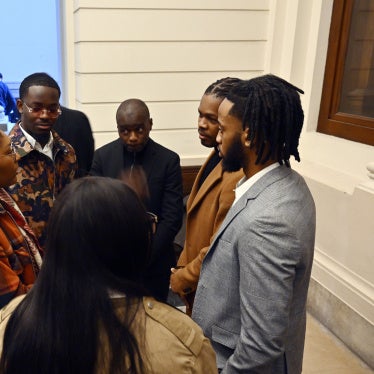Since Tunisians ousted President Zine el-Abidine Ben Ali four weeks ago, many refugees have returned to emotional homecomings, while other émigrés have said they will head home soon to help build a new Tunisia.
But the surprise arrival over the last few days of 4,000 Tunisian "boat people" to the small Italian island of Lampedusa, off the Sicilian coast, is a stark reminder that, "Jasmine Revolution" or no, many Tunisians see their best chance for a better life in Europe rather than at home.
Tunisia may commonly be labeled a middle-class Arab nation, but it still has a large underclass, and even for the moderately well-off, the standard of living remains far below that of Europe. Little surprise, then, that many Tunisian youth are ready to risk their lives crossing the Mediterranean in rickety boats. Some who reached Lampedusa say they also fear continuing instability at home. While their status has yet to be determined, most will likely be repatriated to Tunisia if they cannot make a viable case for asylum.
Tunisia's transitional government is now faced with the difficult task of responding to the economic demands of an impatient public. The government is headed by Prime Minister Mohammed Ghannouchi -- the only holdover from Ben Ali's last council of ministers following a cabinet shake-up on Jan 27. The government includes many respected independent figures and leaders of two small opposition parties. On Feb. 9, parliament voted to give acting President Fouad Mebazaa, the speaker of the assembly, the authority to rule by decree.
Labor unrest has mounted following Ben Ali's departure, which lifted the lid on the population's long-suppressed demands. Elementary school teachers went on strike on Jan. 24, the day schools were to reopen, keeping many parents home from work. Baggage handlers at Tunis's airport walked off the job on Jan. 31, forcing at least one arriving jet to turn back mid-voyage. Last week, it was sanitation workers in Tunis seeking better working conditions and benefits. And unemployed university graduates have held frequent rallies in front of government ministries, demanding state jobs.
These strikes have clouded the country's short-term economic outlook, while sustained street protests have tested the police force, which is ill-trained in nonviolent crowd control techniques. Adding to this combustible mix is the pervasive suspicion that militias and provocateurs from the deposed regime are provoking crowds and instigating violence, calculating that fear and instability benefits them and whoever is giving them their orders.
The transitional government, led by Mebazaa, has moved ahead boldly on human rights issues, communicating a determination to break with the repressive past. The government has conditionally freed most of the 500-plus political prisoners held at the end of Ben Ali's presidency, pending a promised general amnesty. It also has promised that Tunisia will join the International Criminal Court, making it the first North African state to do so, and become a signatory to other international human rights treaties.
The transitional government also has taken steps to dismantle the infrastructure that enabled Ben Ali's repressive rule. It has formed a commission to recommend legal revisions that will ensure the general elections promised for later this year are free and fair. The reformist interior minister announced he would sack 42 high officials associated with the old leadership. Judges renowned for their high conviction rates in political cases have been reassigned to desk jobs. But there has been no indiscriminate de-Baathification-style purges so far; the new ministers have retained most of the high-level bureaucracy they inherited, at least for now.
One dramatic change is in the state-run and state-influenced media. Now, the national media is giving voice to the grievances of ordinary Tunisians, putting thinkers and activists blacklisted until one month ago on camera. Tunisia has become the only North African country where people seem to be tuning in to their own television stations as much as Al Jazeera.
These are positive steps -- but the challenge, exemplified by the arrival of thousands of Tunisian refugees on the shores of Italy and the need to reassure foreign investors and tourists, still looms large. One can only hope that the tangible gains Tunisians have achieved since ousting Ben Ali will strengthen their resolve to get through the tough economic and political challenges that lie ahead.
Eric Goldstein is deputy Middle East and North Africa director for Human Rights Watch.







